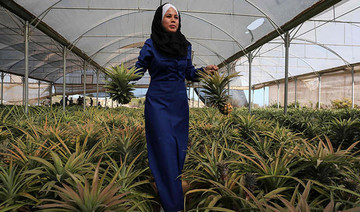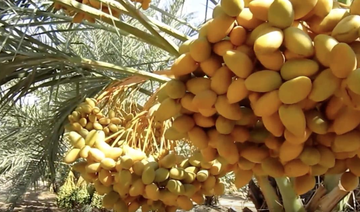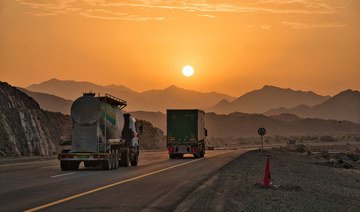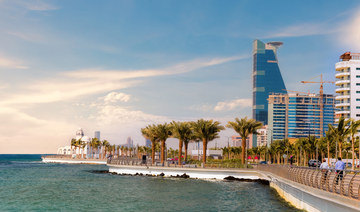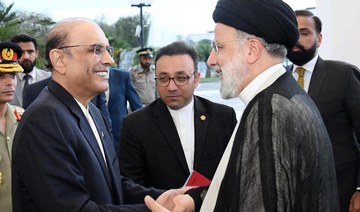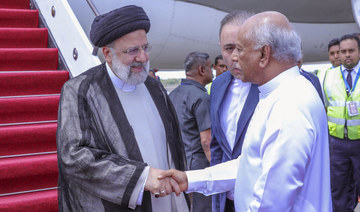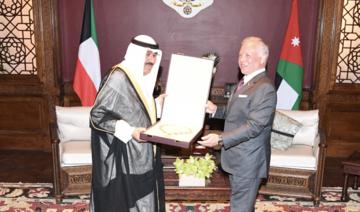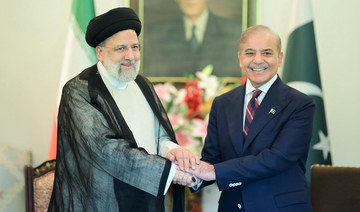NABLUS, Palestinian Territories: Palestinian farmer Mahmud Abu Shinar surveys two rows of severed olive trees — something he says has become a sadly familiar sight.
He didn’t see who took a chainsaw to them at night, but he blames residents of an Israeli settlement a few hundred meters (yards) away.
“We came on Sunday and were shocked that all these trees were cut down,” Abu Shinar said.
“I called the landowner. They came and the (Israeli) army and security forces came too. But of course, it was useless.”
Olives are perhaps the most well-known and abundant Palestinian product, with trees lining valleys and terraced hillsides throughout the occupied West Bank.
The first rains after the hot summer months are the signal for farmers to begin harvesting their crop, but it can come with risks.
In many places, farmers say they face intimidation and violence from nearby settlers and call in support from foreign and Israeli supporters, including Jewish rabbis, to protect them and their crops.
Some of the incidents are seen as attempts at revenge following Palestinian attacks on Israelis, even if the farmers targeted were not involved.
In other cases, say rights groups, there is little motivation other than just to destroy Palestinian property.
Some rights groups have distributed video footage of such incidents in a bid to pressure Israeli authorities to act.
Israeli settlers charge that their crops have also been damaged by Palestinians, including an incident in May when around 1,000 grapevines were allegedly destroyed.
More than 7,000 Palestinian-owned trees have been vandalized so far this year, according to the United Nations.
In the whole of 2017, it was less than 6,000, the year before only 1,600.
Abu Shinar said that in recent weeks around 200 trees had been destroyed in fields he works on near Ramallah in the central West Bank, costing thousands of dollars in lost earnings.
“They want the land,” he said, of the settlers. “Who else would come and commit a crime like this?”
The body that represents West Bank settlements said there was also an increase in attacks on Israeli-owned farms, labelling it “agricultural terror.”
Israeli police said they were “investigating a number of incidents when damage was caused to olive trees.”
“There have also been a number of complaints made by Jewish owners of fields of damage caused to olive trees.”
Patrols have been stepped up, police spokesman Micky Rosenfeld said.
But rights groups charge that Palestinian crops have long been vandalized by settlers without any serious effort by the authorities to stop it.
Around 400,000 Israelis live in settlements that dot the West Bank and range in size from large towns to tiny hamlets.
The international community considers them illegal.
A few dozen kilometers north of Abu Shinar’s trees near the city of Nablus, a small group huddles under a tree, picking through the leaves for olives.
Just 10 meters away stands an abandoned house daubed with Hebrew graffiti, while the Israeli settlement of Har Brakha is over a hill.
Israeli forces patrol the area, with one soldier telling the Palestinians they are “there to help.”
But the farmers said that two days earlier settlers had run down and damaged trees. They claimed the army is often slow to react and sides with settlers.
They invite international and Israeli supporters to attend the picking season to help protect themselves.
Retired British woman Caroline, who declined to give her full name, said she had been coming each year for a decade to work with Palestinian communities close to “particularly difficult settlements.”
This year, she said, she went with a female farmer to her land near a settlement, but the army blocked their path.
“When she eventually got into the groves, 100 of her trees had been chainsawed down by settlers. There weren’t even any olives for us to pick,” she said.
Rabbi Gil Nativ makes sure to wear his kippa cap as he picks olives to show Palestinians not all Jews support Israeli settlement expansion.
“Some (Israelis) consider us as traitors,” said Nativ, who volunteers for the Rabbis for Human Rights organization.
“For me the main principle of the Jewish faith is all men are created in the image of God and all human beings are descendants of the same Adam and Eve.”
Yigal Dilmoni, CEO of the Yesha Council which represents Israeli settlements, said in a statement to AFP that they “deplore all acts of vandalism and purposeful destruction of property.”
He highlighted a series of Palestinian attacks on Israeli settlements.
Olive tree sabotage plagues Palestinian farmers
Olive tree sabotage plagues Palestinian farmers

- Olives are perhaps the most well-known and abundant Palestinian product
- More than 7,000 Palestinian-owned trees have been vandalized so far this year, according to the United Nations
Gaza could surpass famine thresholds in six weeks, WFP official says
“We are getting closer by the day to a famine situation,” said Gian Caro Cirri, Geneva director of the World Food Programme (WFP).
“There is reasonable evidence that all three famine thresholds — food insecurity, malnutrition and mortality — will be passed in the next six weeks.”
A UN-backed report published in March said that famine was imminent and likely to occur by May in northern Gaza and could spread across the enclave by July. On Tuesday, a US official said the risk of famine in Gaza, especially in the north, was very high.
Cirri was speaking at the launch of a report by the Global Network Against Food Crises, an alliance of humanitarian and development actors including United Nations agencies, the World Bank, the European Union and the United States.
In its report, the network described the 2024 outlook for the Middle East and Africa as extremely concerning due to the Gaza war and restricted humanitarian access, as well as the risk of the conflict spreading elsewhere in the region.
“As for Gaza, the conflict makes it difficult and sometimes impossible to reach affected people,” Cirri said.
“We need to scale up massively our assistance... But under the current conditions, I’m afraid the situation will further deteriorate.”
The United Nations has long complained of obstacles to getting aid in and distributing it throughout Gaza in the six months since Israel began an aerial and ground offensive against Gaza’s ruling Islamist militant group Hamas.
Israel has denied hindering supplies of humanitarian aid and blames aid agencies for inefficiencies in distribution.
Israel’s military campaign has reduced much of the territory of 2.3 million people to a wasteland with a humanitarian disaster unfolding since Oct. 7, when Hamas ignited war by storming into southern Israel.
Cirri said that the only way to steer clear of famine in Gaza was to ensure immediate and daily deliveries of food supplies.
“They’ve been selling off their belongings to buy food. They are most of the time destitute,” he said.
“And clearly some of them are dying of hunger.”
Jordan King, Kuwait Emir stress on importance of reducing regional tensions, avoid escalation
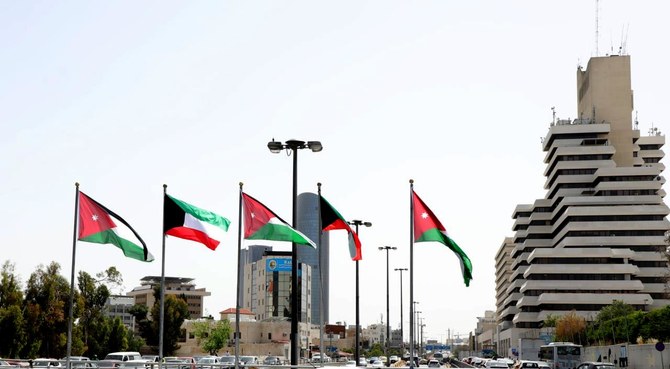
DUBAI: King of Jordan Abdullah II and Emir of Kuwait Sheikh Mishal Al-Ahmad Al-Jaber Al-Sabah stressed on the importance of reducing tensions in the Middle East and avoiding military escalation, according to Petra News Agency.
A joint Jordanian-Kuwaiti statement was issued on Wednesday after the Emir’s two day state visit to the Kingdom.
Both leaders discussed ways to enhance a joint Arab action aimed at confronting emerging regional challenges as well as serving common Arab issues.
The leaders affirmed their support for any steps that ensure the security and stability of the region and stressed the importance of giving priority to dialogue and diplomatic solutions in resolving differences and conflicts.
Their Majesties and Highnesses discussed reaching a just solution to the Palestinian issue and implementing the two-state solution.
The discussions also included talks on investment and tourism, as well as ways to increase trade between Jordan and Kuwait.
Iran cuts Syria presence after strikes blamed on Israel: monitor
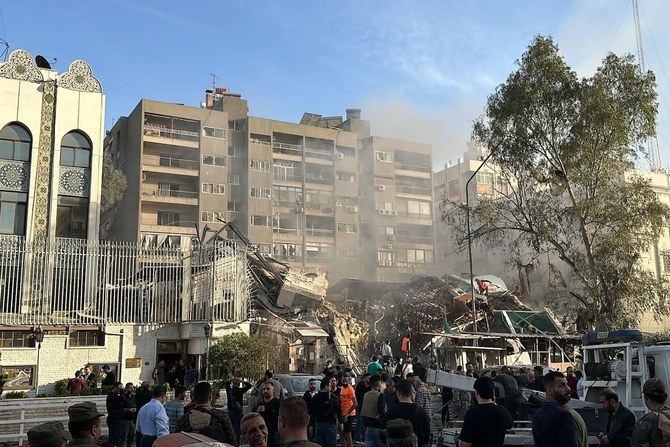
- Iran withdrew its forces from southern Syria, including both Quneitra and Daraa provinces
- Iran has said repeatedly that it has no combat troops in Syria, only officers to provide military advice and training
BEIRUT: Iran has reduced its military footprint in Syria after a succession of strikes blamed on Israel, a source close to Iran-backed militant group Hezbollah and a war monitor said Wednesday.
Iran has provided military support to Syrian government forces through more than a decade of civil war but a series of strikes targeting its commanders in recent months has prompted a reshaping of its presence, the sources said.
“Iran withdrew its forces from southern Syria,” including both Quneitra and Daraa provinces, which abut the Israeli-annexed Golan Heights, the source close to Hezbollah said.
But it still maintains a presence in other parts of the country, the source added.
Recent months have seen a series of strikes on Iranian targets in Syria, widely blamed on Israel, culminating in an April 1 strike that levelled the Iranian consulate in Damascus and killed seven Revolutionary Guards, two of them generals.
That strike prompted Iran to launch a first-ever direct missile and drone attack against Israel on April 13-14 that sent regional tensions spiralling.
But Iran had already begun drawing down its forces after a January 20 strike that killed five Revolutionary Guards in Damascus, including their Syria intelligence chief and his deputy, the source close to Hezbollah said.
Britain-based war monitor, the Syrian Observatory for Human Rights, said Iranian forces had withdrawn from Damascus and southern Syria.
Iran-backed Lebanese and Iraqi fighters had taken their place, Observatory chief Rami Abdel Rahman said.
Iran has said repeatedly that it has no combat troops in Syria, only officers to provide military advice and training.
But the Observatory says as many as 3,000 Iranian military personnel are present in Syria, supported by tens of thousands of Iran-trained fighters from countries including Lebanon, Iraq and Afghanistan.
Abdel Rahman said that many of Iran’s advisers had left Syria over the past six months, although some remained in Aleppo province in the north and in Deir Ezzor province in the east.
Jordan King issues decree to hold parliamentary elections - state TV
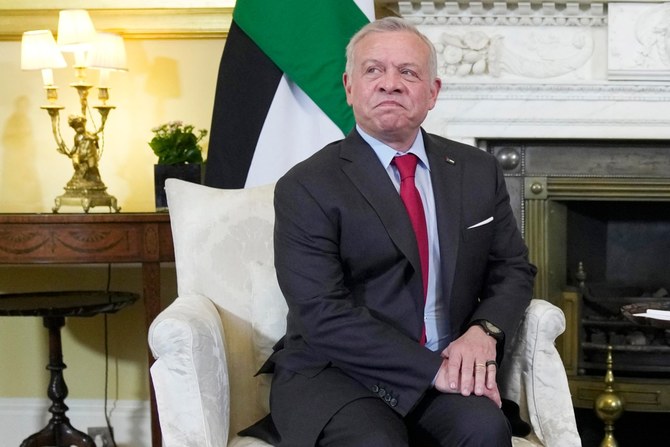
DUBAI: Jordan’s King Abdullah issued a royal decree on Wednesday announcing that a parliamentary election will be held, state TV said.
Under the constitution, the multi-party election is usually held within four months of the end of a four-year term of parliament. The country’s last election, with over 4.6 million eligible voters, was held in November 2020.
An independent election commission decides the exact date.
Iran, Pakistan urge UN Security Council to take action against Israel
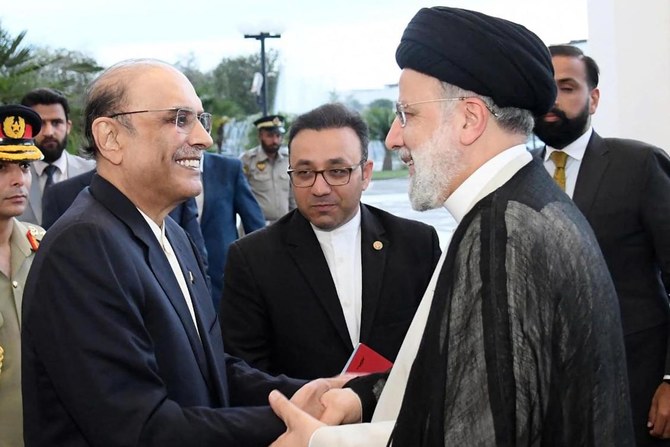
- The joint statement followed a three-day visit to the country by Iranian President Ebrahim Raisi
- Muslim neighbors Iran and Pakistan are seeking to mend ties after unprecedented tit-for-tat military strikes this year
ISLAMABAD: Iran and Pakistan called on the United Nations Security Council in a joint statement issued on Wednesday to take action against Israel, saying it had “illegally” targeted neighboring countries and foreign diplomatic facilities.
The joint statement, released by Pakistan’s foreign ministry, followed a three-day visit to the country by Iranian President Ebrahim Raisi at a time of heightened tensions in the Middle East.
Explosions were heard last Friday over the Iranian city of Isfahan in what sources said was an Israeli attack. However, Tehran played down the incident and said it had no plans for retaliation.
“Recognizing that the irresponsible act of the Israeli regime forces was a major escalation in an already volatile region, both sides called on the UN Security Council to prevent the Israeli regime from its adventurism in the region and its illegal acts attacking its neighbors...,” Iran and Pakistan said in their joint statement.
Muslim neighbors Iran and Pakistan are seeking to mend ties after unprecedented tit-for-tat military strikes this year.
Raisi, who wrapped up his visit and flew on to Sri Lanka on Wednesday, vowed to boost trade between Iran and Pakistan to $10 billion a year.
During his visit to Pakistan, Raisi was quoted by Iran’s official IRNA news agency as saying any further Israeli attack on Iranian territory
could radically change the dynamics and result in there being nothing left of the “Zionist regime.”
On April 13, Tehran launched a barrage of missiles and drones at Israel in what it said was retaliation for Israel’s suspected deadly strike on the Iranian embassy compound in Damascus on April 1, but almost all were shot down.
Pakistan has previously called for de-escalation by “all parties.”
Iran and Pakistan vowed during Raisi’s visit to boost trade and energy cooperation, including on a major gas pipeline deal that has faced delays due to geopolitical issues and international sanctions.



